The Calgary Flames are now a team made in the image of head coach Darryl Sutter. That means fans of the Boys in Red will see a mind-numbing brand of defensive hockey where controlling the puck, moving it quickly and limiting shots on goal is the focus. Add in outstanding play by goaltender Jakob Markstrom and the theory goes that the Flames will steal one-goal wins all the way to the Stanley Cup this season.
Related: Calgary Flames Could Regret Choice of Sutter for Coach
Does all this mean that the Cowtown boys don’t need to worry about goal production? If it does, that will come as a relief to many fans in the Stampede City because the team just can’t score. It’s been that way for years and there’s not much reason to believe that will change this year.
Sutter’s defense first, dump and chase style of hockey may still have a place in today’s NHL. Even so, championship contenders still need to be able to score.
Flames’ Scoring is Mediocre
Last year, the Flames notched 2.77 goals per game (GF/G) for a total of 155 goals – good enough for 19th overall in the NHL. The top five goal scorers – Johnny Gaudreau, Elias Lindholm, Matthew Tkachuk, Andrew Mangiapane and Dillon Dube, racked up just over 53% of those goals and earned just over $23 million between them last season.
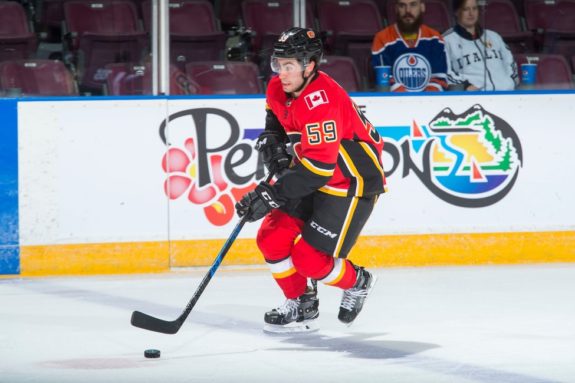
In contrast, the lowly Ottawa Senators also scored 155 goals and their top five goal scorers generated 50% of those markers. Yet together, they earned just shy of $10 million last year. Compared to Calgary, scoring goals is much less expensive in Ottawa.
Now, I can hear many Flames fans lighting their hair on fire protesting that of Ottawa’s top five scorers consisting of Connor Brown, Brady Tkachuk, Josh Norris, Drake Batherson and Evgeni Dadonov; three were on entry-level contracts (ELC), so the cost per goal comparison just isn’t fair. That’s true, but isn’t that even more damning of the Flames offense? A group of Flames veterans (exception Mangiapane) couldn’t score more than Ottawa’s top guns, three of whom were on ELCs. That’s an unflattering picture.
Related: 3 Reasons the Flames Missed the 2021 Playoffs
Calgary’s offensive production has been like that for a long time. In 2019-20 the team ranked 20th in goal production – just one notch ahead of the Buffalo Sabres. That organization has been a dumpster fire for years. In 2017-18 the Flames ranked 27th – just one ranking above the rebuilding Detroit Red Wings. The year before that, they ranked in the middle of the league at 16th.
I can already hear some fans howling that the Flames clinched the best record in the Western Conference in 2018-19, scoring 289 goals to rank second after the Tampa Bay Lightning. Even so, one year does not a reputation make and the Flames have been perfectly average when it comes to goal production ever since.
No Flames in NHL’s Top 40 Scorers
For all the talk in the Stampede City about the Flames’ talented top six, the fact is that the team hasn’t had any of their sharpshooters among the league’s top ten points getters since Johnny Gaudreau earned the seventh spot in 2019. Last year only Gaudreau and Lindholm managed to crack the list of Top 40 points getters snatching the 30th and 39th spots, respectively. Neither registered more than 19 goals on NHL score sheets last season, putting them outside the NHL’s top 40 goal scorers.
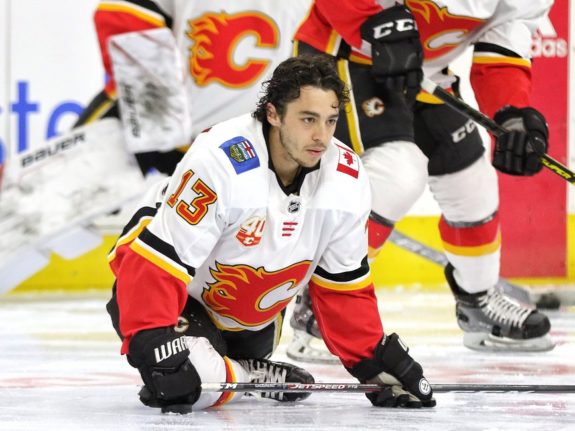
The fact is that the team hasn’t had an elite goal scorer in years. Sure, a few years back, Gaudreau and Sean Monahan broke the 30-goal barrier – one that most pundits agree puts a player in the elite category – but that hasn’t happened in several years. Neither player has ever put up 30 goals or more consistently at any point in their career.
Related: Flames Slow Start Could Lead to Gaudreau, Monahan & Tkachuk Trades
Whether Gaudreau and Monahan could have been elite snipers in the NHL if they were playing with a better supporting cast is the subject of much debate. Yet the fact is that the Flames have not been able to secure much depth in their forward lines in the last number of years.
It seems they prefer to get by hiring journeymen on short-term contracts at budget prices. To wit the cheap one-year contracts of old warhorses such as Brett Ritchie, Erik Gudbranson, Brad Richardson and Trevor Lewis. Where other teams in the league are seeking speed and youth, Calgary seems bent on adding the slow and aged to its roster.
You may also like:
- Projected Lineups for the Flames vs Sharks – 4/9/24
- Flames GM Conroy Discusses Potentially Drafting Tij Iginla
- Flames More of a Little Brother Than Rival to Oilers
- Flames’ Andrei Kuzmenko Proving He Is More Than a Cap Dump
- Projected Lineups for the Oilers vs Flames – 4/6/24
It is true that Flames general manager Brad Treliving managed to add Blake Coleman to the lineup this summer, and he will no doubt bolster the top six, possibly providing some support to Gaudreau and Monahan. Even so, he is not a goal scorer, having hit the score sheet in Tampa last year with just 14 goals in 55 games. His career-high is only 22 goals as a New Jersey Devil.
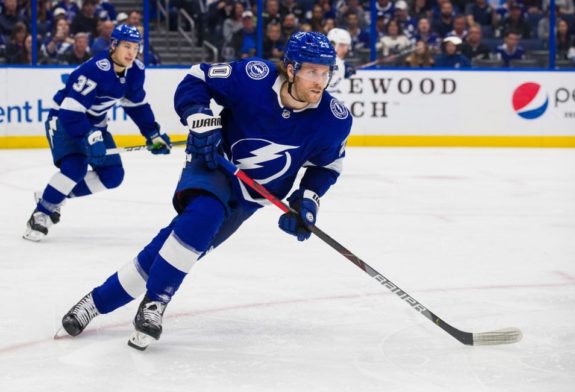
None of the short-term rentals in the bottom six that Treliving has brought to Cowtown this summer seems able to step up should the team’s small group of goal producers falter. That goal scoring is so unevenly spread across the team is a weakness with which Sutter will grapple. Fully 70% of the goals scored by the Flames forwards were racked up by the top six. (Statistics from Hockey Reference)
Do The Flames Really Need More Scoring?
Alright, so Calgary Flames fans have never been used to seeing their boys shoot the lights out in the Saddledome. What of it? Must they be a high-scoring team to succeed if they take Sutter’s system to heart?
The fact is that Stanley Cup victories require respectable offensive numbers. The Tampa Bay Lightning’s championships in 2020 and 2021 were underpinned by regular-season GF/G figures of 3.47 and 3.21, respectively. Not only that, but Tampa scored significantly more goals than they allowed on the season. Contrast that with the Flames, where they allowed more goals than they scored in three of the last five seasons.
The St. Louis Blues won the Cup in 2019 with a GF/G of 2.98 – a figure comparable to Calgary’s 2.77 last year, but the Blues’ number was skewed by a disastrous performance in the first half of the season. What’s more, they racked up significantly more goals than they allowed. A GF/G of 2.98 was not the true measure of the Blues’ offensive firepower.
Sutter believes that the NHL is a one-goal league. With great goaltending and a team that can battle opponents to a draw at even strength to keep games low scoring affairs, victories can be eked out by a goal or two with special teams. Not only that, but a game built on Sutter’s trademark “dump and chase” approach with a relentless forecheck can be the difference-maker.
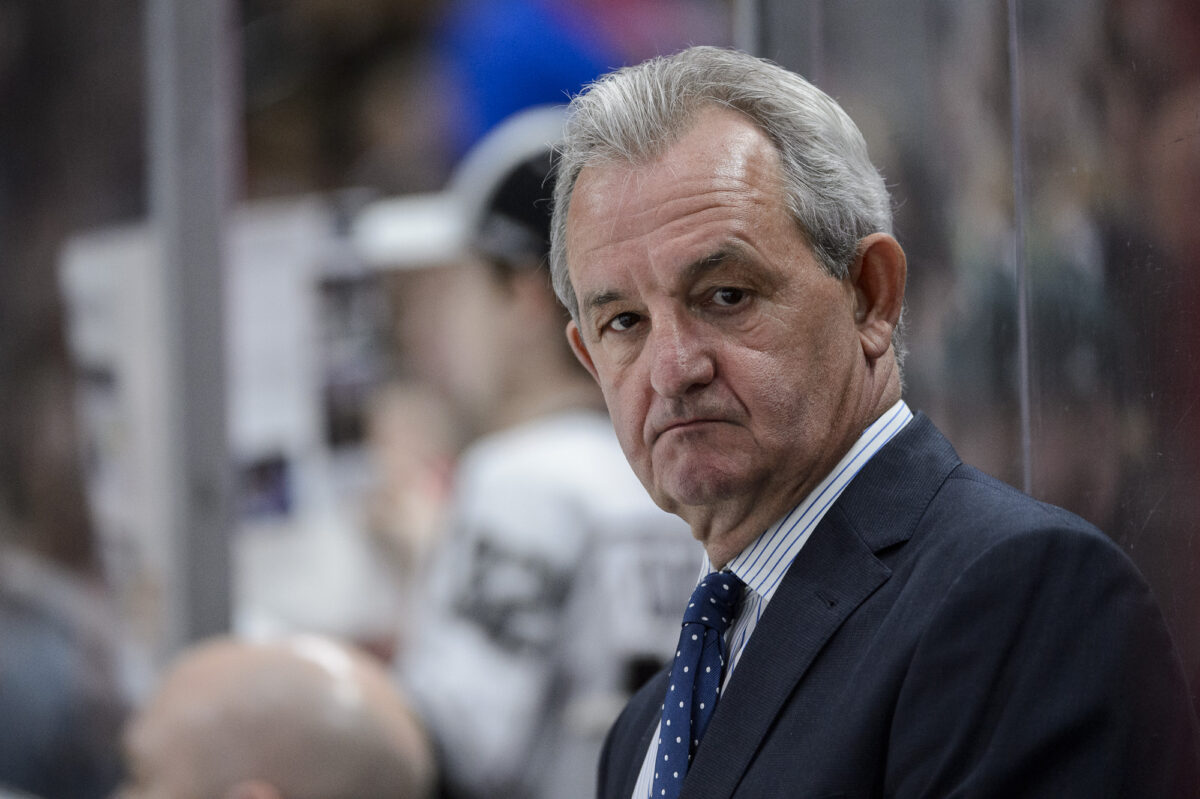
That may be true, but Calgary lacks the physical size to play that game. What’s more, it’s much less effective when facing a big bruising blue line on the other side. Just ask the Montreal Canadiens when they tried that with the Tampa Bay Lightning in last year’s Cup final.
As for Calgary’s goaltending, that is a question mark. Markstrom was a disappointment last year with a .904 save percentage and a 2.66 goals-against-average per game. That put him 38th and 25th respectively in the NHL’s goalie rankings in those categories. Those numbers may improve if he has a tight defense corps playing in front of him, but that is in doubt this year with the loss of Mark Giordano in the Seattle Expansion Draft this past July.
Related: Flames 2021 Report Cards: Jakob Markstrom
Yet, that isn’t the only concern with Calgary’s goaltending. As much as he may wish, Markstrom can’t play 82 games and will need a break from time to time. That means the Flames will need to turn to unproven backup Daniel Vladar who has just five regular-season NHL games under his belt. The question then is can Calgary’s goaltending help overcome the team’s poor points production.
Flames Face Big Challenges if Sutter’s System Flounders
Treliving failed to make the big trades and acquisitions that many Calgary fans had been demanding this summer. That may be because he wants to double down on the group of core players he assembled and Sutter as his choice of coach. Either that or, as he explained it in several press conferences this fall, he was simply unable to make the trades many wanted. Either way, the team is not significantly different than it was last season.
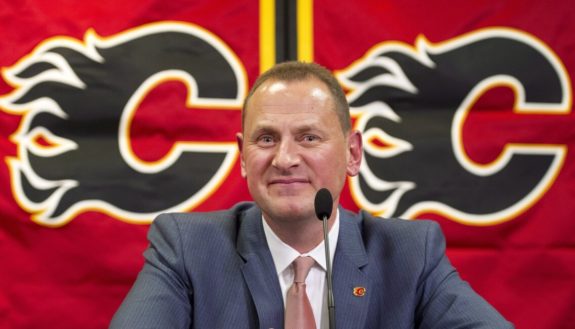
No matter how effective the “Sutter system” may prove to be this year, the Flames still need to score goals to succeed. Teams don’t win Stanley Cups with defense alone. The Calgary core needs to find a way to produce goals when they are needed.
If that doesn’t happen, fans can bet on massive changes in Calgary next spring.